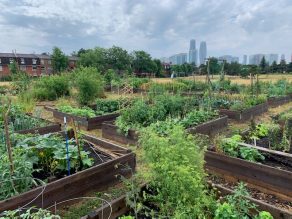Mississauga Community Gardens Produced Highest Yield in History during Pandemic
Environment | December 16, 2020
This year, the City of Mississauga’s community gardens grew their highest yield in history – 3,366 pounds or 1,527 kilograms of produce. This comes at a time when access to food is more important than ever. More than 8,350 volunteer hours contributed to producing food for the community.
The City supports nine community gardens through a partnership with Ecosource. The opening of these community gardens came later than usual this spring, as the City implemented the necessary COVID-19 health and safety protocols and restrictions. Each community garden has been set up differently. Typically, the gardens include two areas: one for residents to rent and produce their own food while the other area is for community growing to produce food for nearby food banks and community programs.
Though COVID-19 affected educational and training programs that typically take place in the community gardens, Ecosource quickly redirected its energy to supporting residents growing food at home. This was done through interactive gardening webinars, hosting virtual cook-alongs with garden-fresh produce, and distributing recipe boxes of locally produced food to social service agencies. Through these activities, 2,000 residents were reached through food programs during the pandemic.
Despite this year’s challenges, improvements continued to be made to the community garden program so that they could serve more residents. The Churchill Meadows Community Garden was expanded to include 45 beds this season and welcomed gardeners from the nearby Erin Mills Farmer’s Market.
With support from the City of Mississauga and United Way Greater Toronto, Ecosource also rebuilt the Malton Community Garden to include 22 raised beds. This rebuild comes in time to celebrate the Malton Community Garden’s 10th anniversary and will provide additional opportunities to engage residents and community groups in gardening activities in years to come.
Urban agriculture plays a significant role in promoting food security, which has been captured within the City’s Climate Change Action Plan. In 2021, the City will also develop an Urban Agriculture Strategy to help mitigate climate-related impacts and enhance community-level resilience and preparedness.
Work will continue next year on establishing these gardens and building connections with local residents and organizations to make the gardens vibrant, community spaces.
To learn more about community gardens in Mississauga, visit mississauga.ca/services-and-programs/forestry-and-environment/community-gardens/.
Tags
Media Contact:
City of Mississauga Media Relations
media@mississauga.ca
905-615-3200, ext. 5232
TTY: 905-896-5151
